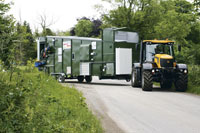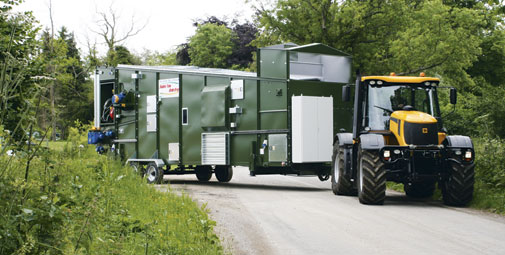New drier from Alvan Blanch is truly mobile

A new mobile continuous flow drier from Wiltshire maker Alvan Blanch, which can travel on the road at speeds up to 30kph (19mph), could be ideal for contractors and farmers wanting a machine that can move between grainstores.
The new mobile drier can handle up to 25t/hr of grain, yet its maker says it can be ready to transport to another site within hours.
“We have produced mobile versions of our double-flow continuous driers for many years,” says the firm’s Andrew Blanch.
“But these have usually been held back by the physical size of the machines.
“While theoretically within the legal limit for on-road travel, the small roads and lanes along which these machines are often expected to travel demand a slightly different approach and some good engineering thinking.”
In this case, it was Hampshire agricultural engineering specialist APECS that suggested the modifications necessary to transform the basic drier into something truly mobile.
“The new concept developed during consultation with one of our clients, Scribeland Contracting,” says the firm’s Jeffrey Allison. “As a sizeable contracting firm, they’ve got farmers with fields to cut and grain to store – but no drier. And during the wet harvest of 2008, that proved a real challenge – so the thinking started.”

Among the changes made to the basic model are a fold-down roof and a detachable hopper, which between them knock almost 1.5m off the machine’s height.
“Easily manoeuvred with a tele-handler, the absence of the hopper lends the machine the same dimensions as a combine,” Mr Allison points out.
“Once off the drier, the hopper, generator and baffled fuel tank can be loaded onto a trailer.”
The mobile drier has all the features of the standard Alvan Blanch continuous flow drier, including improved fuel consumption of up to 15% thanks to the system of low temperatures and high airflow. This reliance on airflow can often extract up to 2% moisture without any heat at all, claims the company.
The mobile drier can deal with a wide range of crops – sunflower seeds, evening primrose and even borage have been successfully handled.

